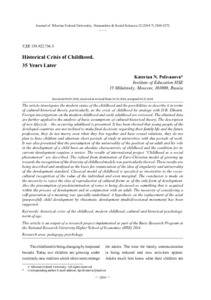Показать сокращенную информацию
Historical Crisis of Childhood. 35 Years Later
| Автор | Polivanova, Katerina N. | en |
| Автор | Поливанова, К.Н. | ru_RU |
| Дата внесения | 2014-12-26T07:23:01Z | |
| Дата, когда ресурс стал доступен | 2014-12-26T07:23:01Z | |
| Дата публикации | 2014-12 | |
| URI (для ссылок/цитирований) | https://elib.sfu-kras.ru/handle/2311/16582 | |
| Аннотация | The article investigates the modern status of the childhood and the possibilities to describe it in terms of cultural-historical theory, particularly, as the crisis of childhood by analogy with D.B. Elkonin. Foreign investigations on the modern childhood and early adulthood are reviewed. The obtained data are further applied to the analysis of basic assumptions of cultural-historical theory. The description of new lifecycle – the occurring adulthood is presented. It has been showed that young people of the developed countries are not inclined to make final decisions regarding their family life and the future profession, they do not marry even when they live together and have sexual relations, they do not plan to have children and alternate short periods of study in universities with due periods of work. It was also presented that the presumption of the universality of the position of an adult and his role in the development of a child been an absolute characteristic of childhood and the condition for its current development requires a review. The results of international project “Childhood as a social phenomenon” are described. The refusal from domination of Euro-Christian model of growing up towards the recognition of the diversity of childhood models was particularly showed. These results are being described and analyzed as the basis for renunciation of the idea of singularity and universality of the development standard. Classical model of childhood is specified as insensitive to the sociocultural recognition of the value of the individual and even marginal. The conclusion is made on the necessity to reject the idea of reproduction of cultural forms as of the only form of development. Also the presumption of predetermination of sense is being discussed as something that is acquired within the process of development and in conjunction with an adult. The necessity of considering a self-generation of a meaning was specially underlined. A hypothesis on the replacement of the axial (purposeful) child development by rhizomatic development (multidirectional movement) has been suggested | en |
| Аннотация | В статье поднимается вопрос о современном состоянии детства и возможности его описания в терминах культурно-исторической теории, в частности, как кризис детства по аналогии с работами Д.Б. Эльконина. Приведен обзор зарубежных исследований современного детства и ранней взрослости. Представлен данные далее использованы в анализе базовых допущений культурно-исторической теории. Дано описание нового этапа жизненного цикла – возникающей взрослости, показано, что молодые люди в развитых странах не склонны принимать окончательных решений относительно семейной жизни и будущей профессии, они не закрепляют браком сексуальные отношения даже в ситуации совместного проживания, не планируют рождение детей, перемежают непродолжительные периоды учебы в университетах с периодами работы. Показано, что презумпция универсальности позиции взрослого и его роли в развитии ребенка как безусловная характеристика детства и условие развитие в нынешней ситуации требует пересмотра. Описаны результаты международного проекта «Детство как социальный феномен», в частности, показан отказ от доминирования евро-христианской модели взросления, и признание многообразия моделей детства. Эти результаты описываются и анализируются как основание для отказа от идеи единственности и универсальности нормы развития. Далее указывается на нечувствительность классической модели детства к социокультурному признанию ценности индивидуального и даже маргинального. Делается вывод о необходимости отказа от представления о воспроизводстве культурных форм как единственной формы развития. Также обсуждается презумпция заданности смысла как того, что приобретается в ходе развития во взаимодействии со взрослым. Указывается на необходимость учета самостоятельного порождения смысла. Предлагается гипотеза о смене осевого (направленного) детского развития ризоматическим (при котором движение может происходить разнонаправленно) | ru_RU |
| Язык | en | en |
| Издатель | Сибирский федеральный университет. Siberian Federal University. | en |
| Является частью серии | Журнал Сибирского федерального университета. Гуманитарные науки. Journal of Siberian Federal University. Humanities & Social Sciences;2014 7 (12) | en |
| Тема | historical crisis of the childhood | en |
| Тема | modern childhood | en |
| Тема | cultural and historical psychology | en |
| Тема | norm of age | en |
| Тема | исторический кризис детства | ru_RU |
| Тема | современное детство | ru_RU |
| Тема | культурно-историческая психология | ru_RU |
| Тема | норма возраста | ru_RU |
| Название | Historical Crisis of Childhood. 35 Years Later | ru_RU |
| Альтернативное название | Исторический кризис детства. 35 лет спустя | ru_RU |
| Тип | Journal Article | |
| Тип | Published Journal Article | |
| Контакты автора | Polivanova, Katerina N.:Institute of Education HSE 13 Milutinsky, Moscow, 101000, Russia;E-mail: kpolivanova@mail.ru | en |
| Контакты автора | Поливанова, К.Н.:Институт Образования НИУ-ВШЭ Россия, 101000, Москва, пер. Милютинский, 13 | ru_RU |
| Страницы | 2166-2172 |

